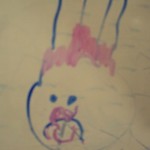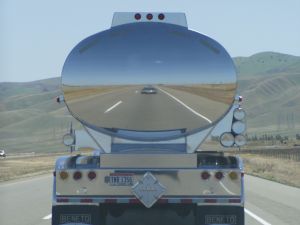One of the reasons children are so likable is their frankness. They say what they’re thinking without filtering it first and are blunt in their comments. This morning Skylar, Micah and I were “working” in the basement on 3 separate “projects” when Skylar asked if she could draw on the white board.
“Sure,” I said, reaching for the pail of special markers. “Why don’t you draw your family,” I said, heading back to my project. As Skylar drew, she sang original little ditties about mommy, daddy, Micah and herself. When she drew a self-portrait, she added stripes above her head with a pink splotch beneath them.
Glancing over from my task I said, “What are those lines?”
“It’s raining on me,” she said, “and that’s my umbrella,” pointing to the pink item.
I complimented her on her artwork, then went back to what I was doing. When she said, “Now I’ll draw God,” I couldn’t resist taking another peek. First she made a big, round head, adding a yellow blob on top.
“What’s that yellow thing?” I said.
“A crown.”
“Oh, I thought it might be an umbrella,” I said, since the thing she drew over her own head looked much like the one over God’s.
But she had a ready answer. Laughing, she said, “Oh, it never rains on God, silly Midgee.”
She drew a wide smile on the face. “God is always happy,” she said. Then pausing, she added, “…unless Micah does bad things.”
And so goes the theology of a 3 year old, a theology God loves and accepts. She had all her facts right:
- God is the ruler over everything.
- Nothing bad happens to God, since he’s in charge.
- God is always happy, except when people do bad things.
And that was Skylar’s concise, concrete, accurate synopsis of who God is. Easy to understand, easy to accept. No wonder God tells us to think like children.
We adults tend to complicate him, adding our own ideas to the little we really know. Much of who he is can’t be bent to comply with logic, so we weave a web of probabilities around him, humanizing him into something he’s not.
Our motive is good: we want to know him better. But the results stray from reality. And that’s the fascinating thing about children. They take what they’ve been told about God, accept it as truth, and have no urge to debunk it, debate it, degrade it or embellish it.
And although I would never attempt to sketch God, for Skylar it was easy.
“Yours, O Lord, is the greatness and the power and the glory and the victory and the majesty, for all that is in the heavens and in the earth is yours. Yours is the kingdom, O Lord, and you are exalted as head above all.” (1 Chronicles 29:11)






